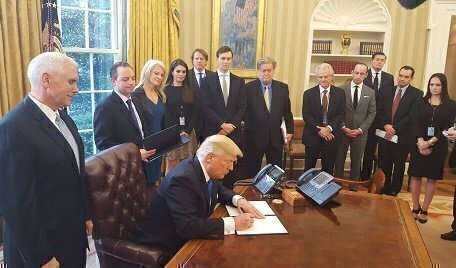For at least the next several weeks, the Trump Administration may enforce in full all of its tough new restrictions on entry into the U.S. of foreign nationals from six nations with Muslim population majorities, after getting temporary permission from the Supreme Court on Monday afternoon. The orders mean that even foreign nationals who have family ties in the U.S., or already have promises of jobs or study opportunities in this country, can be kept out for the time being.
 In two separate and nearly identical orders, with only two of the nine Justices noting dissents, the Court put on hold rulings by federal judges in Maryland and Hawaii that had narrowed the government’s power to put into effect the latest – the third – version of President Trump’s controversial executive orders aimed mostly at Mideast nations.
In two separate and nearly identical orders, with only two of the nine Justices noting dissents, the Court put on hold rulings by federal judges in Maryland and Hawaii that had narrowed the government’s power to put into effect the latest – the third – version of President Trump’s controversial executive orders aimed mostly at Mideast nations.
In response, the Administration asked the Justices last month to allow enforcement without any limitations on the restrictions announced in September. That request was granted in both cases, with only Justices Ruth Bader Ginsburg and Sonia Sotomayor saying – without giving their reasons – that they would deny the plea.
Even though the Justices’ action is only temporary in nature, and takes no position on whether the presidential orders are legally valid, the breadth of the apparent support in favor of full enforcement suggested strongly that the Court is likely to grant review and decide that ultimate question itself after two federal appeals courts have ruled on pending appeals by the government. Both of those courts – in the Fourth Circuit, for the Maryland case, and the Ninth Circuit, for the Hawaii case – will be holding hearings this week.
The Supreme Court’s new orders, each noting that the appeals courts are reviewing the cases on expedited schedules, said it expects them to make their decisions “with appropriate dispatch.”
That could mean that the two cases will return to the Justices in time for review and a final decision during the Court’s current term, which is scheduled to run through late June. A return to the Justices is likely no matter who wins or loses in the two appeals courts. Both of those courts have previously ruled against the Trump Administration on an earlier version of the immigration executive orders.
In the latest version, the restrictions on entry were made permanent, and applied to some or all foreign nationals of eight countries. But, in the challenges in Maryland and Hawaii, enforcement was contested only for the six nations that have Muslim population majorities – Chad, Iran, Libya, Somalia, Syria and Yemen. There was no challenge to the orders’ inclusion of North Korea and of some individuals in Venezuela, and so those restrictions have already been in effect for nationals of those two countries.
The challengers focused on the restrictions as to Muslim-dominated nations to buttress their claim that the presidential orders were part of President Trump’s pursuit of a ban on Muslims seeking to enter the U.S. While the President and his aides have insisted that religion played no part in any of the presidential orders, the challengers have used many public statements by the President to help shore up their argument that the restrictions violate either the Constitution, U.S. immigration-control laws, or both.
The latest attempt to persuade the Justices that the President was biased against Muslims came earlier on Monday, when the American Civil Liberties Union notified the Court of President Trump’s use of his Twitter account last week to promote three anti-Muslim videos distributed by a group known as “Britain First.” His retweets were criticized sharply by the British government, and others.
It is unknown whether the Justices had seen the ACLU letter before they composed the two orders that were issued Monday afternoon. If they had reviewed that letter, it made no apparent difference.
The ACLU, representing the challengers in the Maryland case, plans to notify the Fourth Circuit Court about the President’s retweets of those videos.






